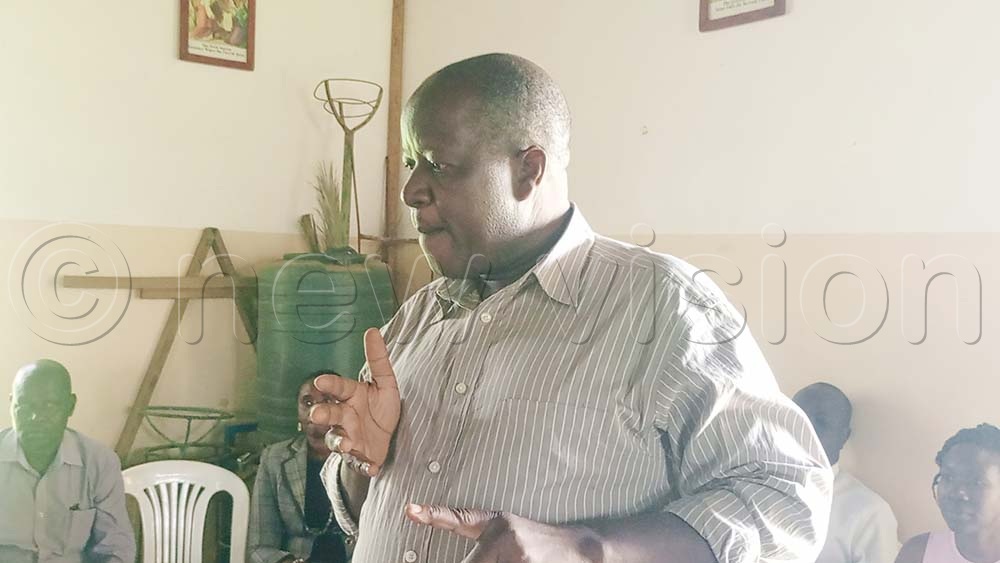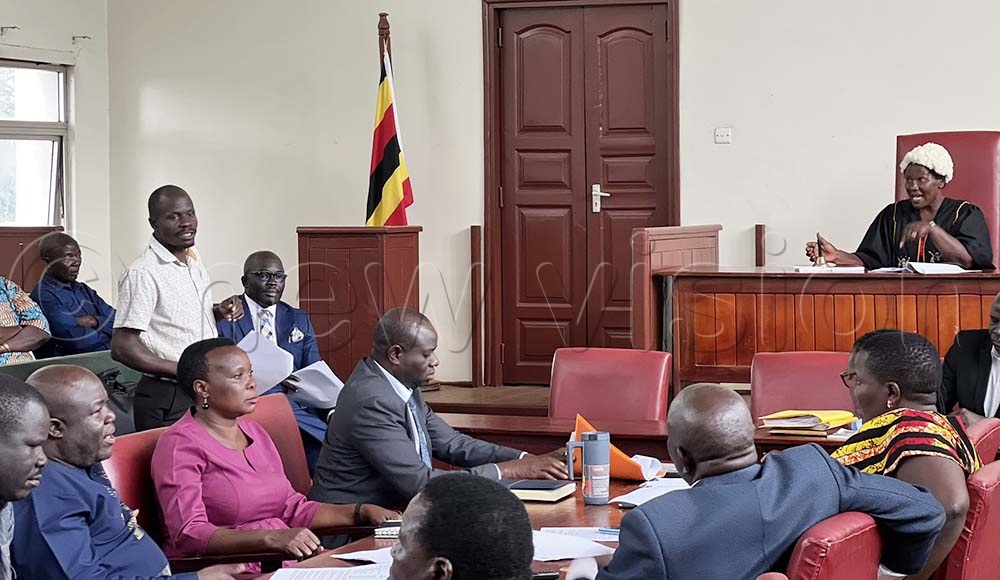Tororo subdivision: District council endorses alteration of boundaries
Seven consultative meetings were held in each constituency, during which local leaders clashed over the proposed district headquarters, names of the new districts, and the allocation of sub-counties.
A consultative meeting at Mukuju county headquarters in Tororo over the district's subdivision. (Credit: George Ofwono)
Deo Waiswa Isabirye, the principal legal officer from the local government ministry, addressing locals in a consultative meeting. (Credit: George Ofwono) A Tororo district council sitting on September 25, 2025. (Credit: George Ofwono)
TORORO - After a full week of intense meetings over the subdivision of Tororo into three new districts and a city, the district council on Thursday (September 25) approved the alteration of boundaries.
Officials from the local government ministry arrived Monday to consult with the area people over the move.
Seven consultative meetings were held in each constituency, during which local leaders clashed over the proposed district headquarters, names of the new districts, and the allocation of sub-counties.
For instance, the proposed Mukuju district, comprising 16 sub-counties in Tororo County South, saw the majority of sub-counties favour Apetai sub-county as the headquarters and the name Tororo district.
Alex Etaing, supported by a number of local leaders at a consultative meeting held at Aputir Catholic Church on Monday, made a case for Apetai.
"Why I say Apetai is because it is at the centre of our county. There is ample land to establish the district headquarters, and if the Northern Corridor road connecting Malaba to Mile 8 Mbale Road is developed, it will be easily accessible to the entire population of Tororo County," he told the meeting.
Etaing said choosing Mukuju as the headquarters would disadvantage other parts of the county.
"Mukuju is very close to the developed Mile 5 trading centre in West Budama. Placing our district headquarters there will continue to empower those in West Budama, potentially at the expense of those who have been marginalised for years."
There were divergent views.
Lucas Okamar, the LC3 chairperson of Kayoro subcounty, argued that relocating the population of Osukuru sub-county to Mukuju would be unjust, arguing that the increased travel distance to Apetai would be excessive, potentially leading Osukuru to opt for annexation to the proposed Tororo city instead.
"We have the authority in our sub-county councils to choose where we want to belong, whether it's the proposed Mulanda district or Tororo City, we will choose what's best for us," he said.
Gerald Omaset, the chairperson of Morikatipe subcounty, argued for retaining the name Tororo, emphasising its familiarity within the county.
But in the Tororo County North meeting held at Mukuju sub-county headquarters, the proposal to move Mukuju district headquarters to Apetai was rejected.
Local leaders in Tororo County North blamed Tororo County South MP Frederick Angura and Paul Sande Emolot, the Emorimori of Teso, for imposing decisions upon them.
"Anyone proposing Apetai as the headquarters should understand they are dragging us back. Mukuju has been our county headquarters for years," said Peter Ekakoro, the district councillor representing Apetai sub-county.
Simon Oguti Padde, the LC3 chairperson of Akadot sub-county, questioned the re-introduction of issues previously resolved at a meeting with President Yoweri Museveni.
"Why bring up issues that will cause more confusion. If Tororo County South doesn't want the district to be called Mukuju, let them stay. We, as seven sub-counties, can form our own district."
Osinde Ekwero, the speaker of Merikit town council, echoed those sentiments, stressing the importance of respecting decisions made at higher levels.
'No one should force us'
Regarding Mulanda, three sub-counties of greater Rubongi, including Rubongi, Osia, and Nyangole, rejected the proposal to be part of it. They stated they were waiting to formally be annexed to Tororo municipality, as per their 2016 request.
George Olowo Mujanja, the LC3 chairperson of Nyangole sub-county, voiced their position.
"We passed a resolution for greater Rubongi to be annexed to the municipality in 2016. The municipality and district council both agreed. No one should force us against our desire. We want to be part of the city," he said.
Solomon Oketcho, the publicity secretary for the NRM Workers' League in Tororo district, supported this view, criticizing the added distance and cost for services in Mulanda.
'Misled'
In the proposed Kisoko district, disagreements arose over the district headquarters. While the Teing Adhola cultural institution and some opinion leaders favored Kisoko, majority preferred Nagongera town council.
"The cultural institution is being misled by a few individuals who think they have great power. They should respect the population's preference," said Obbo Oketch, the district councillor representing Nagongera town council.
This followed a confrontation between West Budama North East MP Fox Odoi and the Teing Adhola cultural institution's prime minister (Jago) Josel Obbo while in a meeting with local government minister in Kampala.
This saw the cultural institution through the chairperson of the Padhola Elders Forum, Thomas Okoth Nyalulu, demand a written apology from legislator Odoi and his colleagues or risk being isolated in Padhola.
In the September 23 press statement, the cultural institution reaffirmed its stance on Kisoko, which is the historical headquarters of West Budama, to be the district headquarters to be called Tororo district.
It also asked government whether it is to do away with the name Tororo district that was part of the 39 districts that was in Uganda at the time of forming the current constitution to go for referendum to delete it.
But on Thursday (September 25), the matter was put to a vote at the Tororo district local government council.
The majority of district councillors favored Nagongera as the headquarters and name for the new district, comprising sub-counties in both West Budama North East and North constituencies.
The alteration of boundaries will now see four new administrative units: Tororo city, Mukuju, Mulanda, and Nagongera districts.